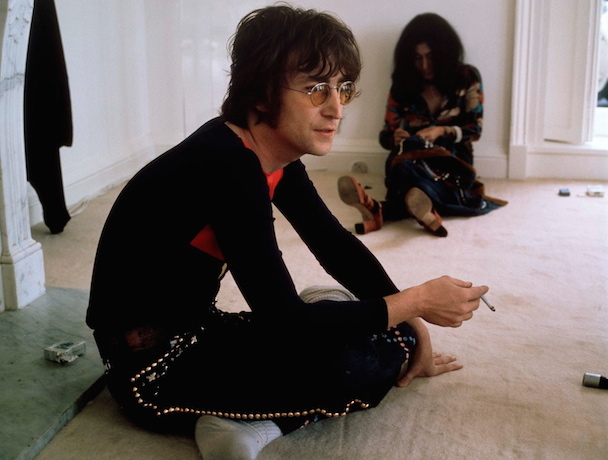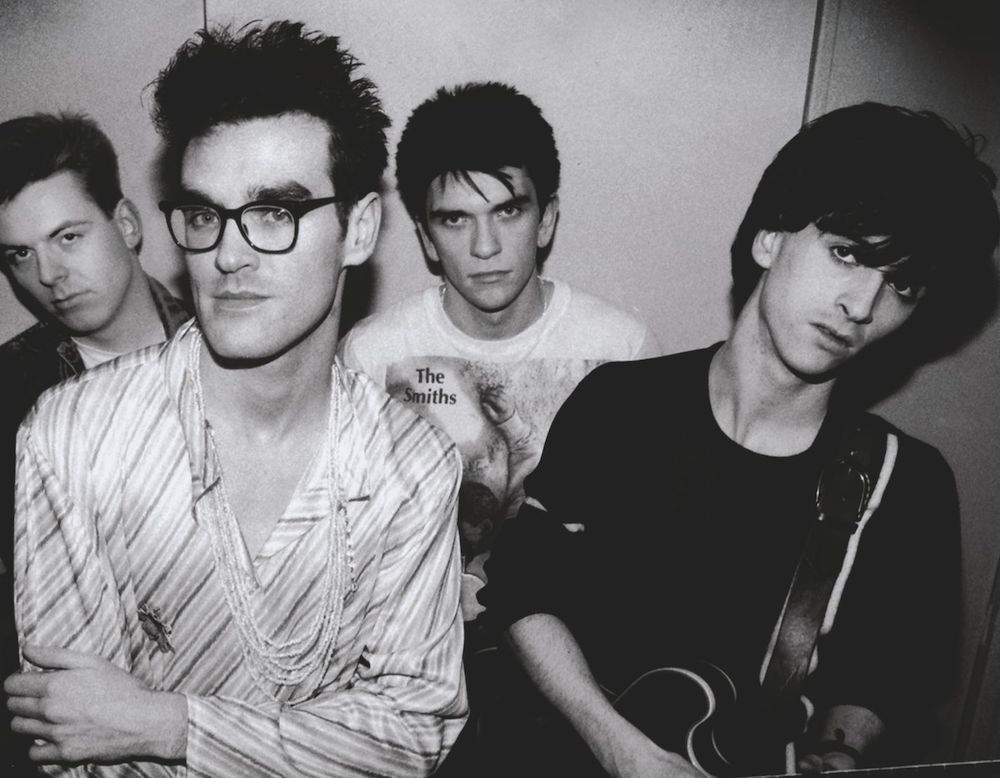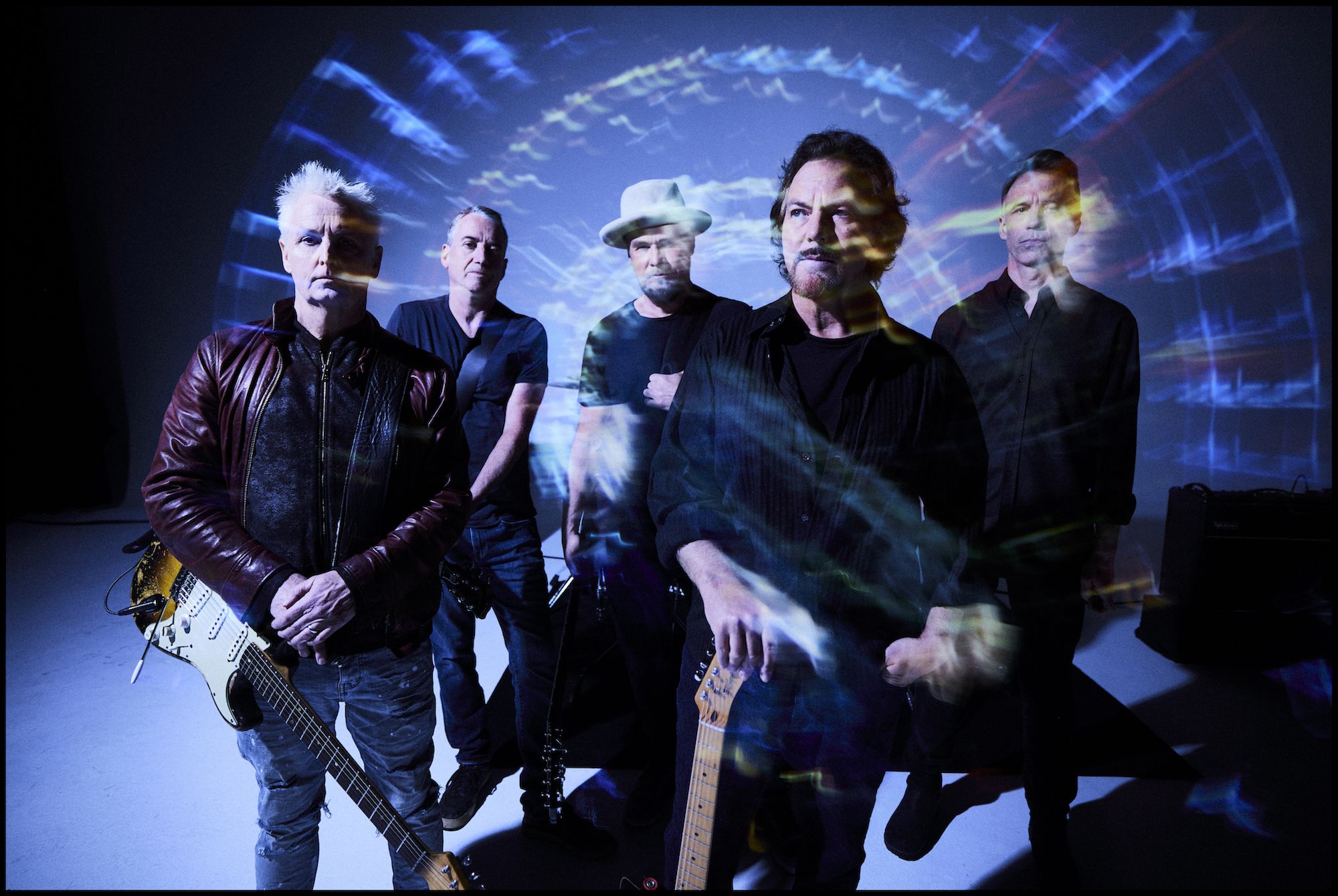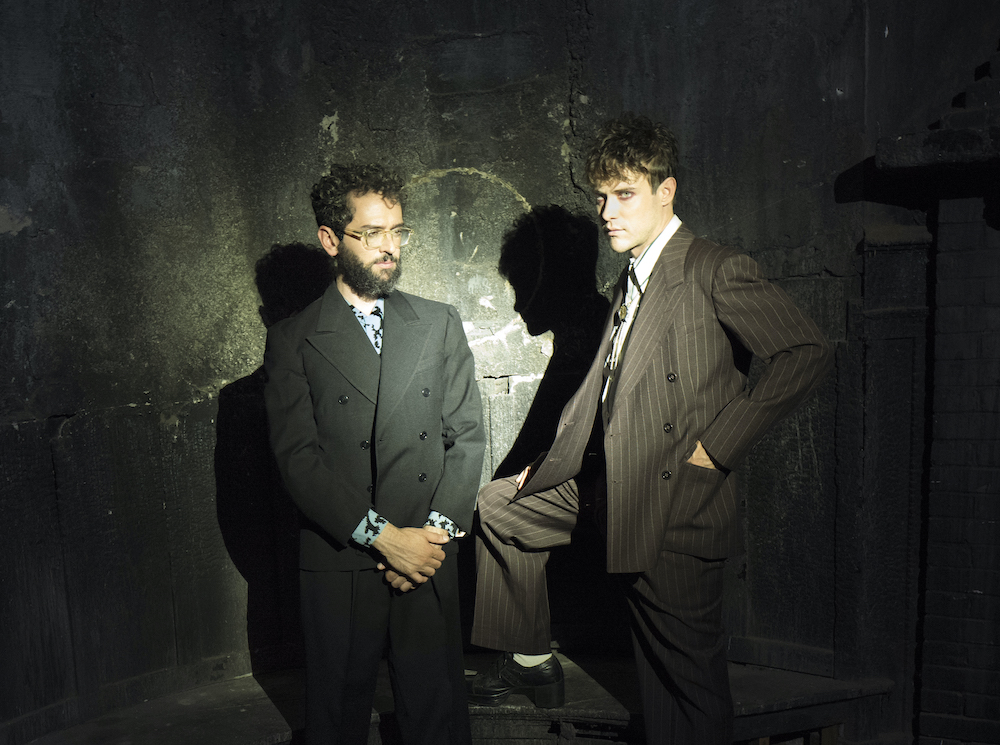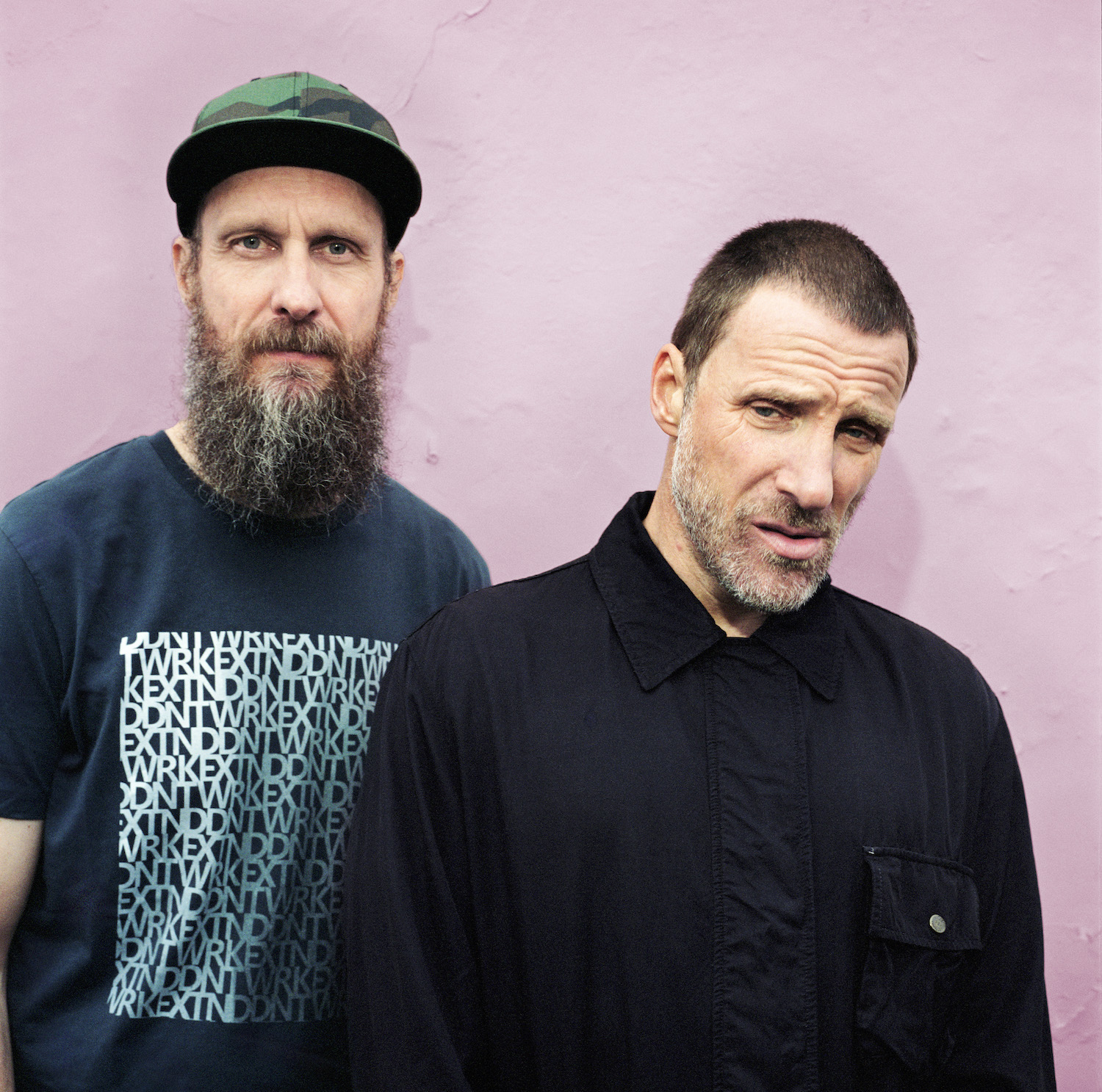John Winston Lennon was famously shot to death at age 40, midway through his tumultuous life and storied career, robbing the world of a towering talent and profoundly ambiguous personality.
During the four-plus decades following his unimaginably tragic and senseless demise, much of Lennon's legacy has become reduced and calcified. For many of the insufferable, apparently unkillable Baby Boomers, Lennon's death became a convenient excuse for a modified beatification -- forever casting him as a kind of petrified Summer Of Love saint, a bespectacled avatar of pacifism and righteous liberal causes. It wouldn't feel so egregious if the actual John Lennon were not a man so completely oppositional in terms of temperament.
The real Lennon was by turns generous and cruel, ingenious and indulgent, scolding and excessive. His politics were a muddled concoction of radicalism and reactionary impulses.
He was the Beatles unquestionable leader, ruling as much through intimidation as ability. That is not to suggest that his ability was less than awesome -- arguably no figure in the rock and roll tradition has ever manifested an equal combination of writing and vocal talent, save perhaps his early hero Chuck Berry. A restless and searching spirit led Lennon down countless musical roads, setting the template for the Beatles experimentations and functionally inventing psychedelia on the fly. Still and to his death, he remained an avowed descendant of Elvis Presley and Sam Cooke, Carl Perkins and Little Richard. Lennon's twinned and simultaneous devotion to extreme progressiveness and nostalgic traditionalism is a paradox that informed both his art and life.
The Clash once sang "Anger can be power/ did you know that you can use it?" If John Lennon knew any one thing, it was certainly this. The single common denominator that can be said to characterize the vast majority of his music and attitude is most undoubtedly rage. The simplistic, utopian vision of what is probably his most famous solo song, "Imagine," is best understood as the aspirational flip side to the roiling toxicity that consumed him for most of his time on Earth. Living life in peace was certainly a fantasy, something about which he knew very little. John Lennon was not an easy or peaceable man. John Lennon was anger condensed to lethal doses of pure, unadulterated invective. John Lennon was Kurt Cobain multiplied by Johnny Rotten -- in short, a holy fucking terror.
Part of the ongoing fascination with the Beatles evolves from the context and clarification that came from the great early solo records recorded by Lennon, Harrison, and McCartney -- the mysteries they revealed, the theories they confirmed. While All Things Must Pass made concrete the notion of George as point man of the Beatles spiritual odyssey and McCartney and Ram underscored Paul's mastery of melody and colorful chronicling of the mundane, John's epochal solo debut[1] Plastic Ono Band laid bare as never before the band's aggrieved and tortured soul. We knew from Beatles tracks like "I'm A Loser," "Help," and "Yer Blues" that Lennon was a man in pain, but it was not until he set out on his own that we could begin to gauge the depth of that despair and the lengths he was willing to go to in order to document it.
The sad and trying details of his childhood and early life -- estrangement from his parents, the untimely and accidental death of his mother, the sudden loss of soulmate and artistic foil Stuart Sutcliffe -- are the grist for many a Lennon biography. But no retelling, no matter how skillful, can approach the power of Lennon's own rendering of his specific internal hell on Plastic Ono Band, arguably the most bleak and harrowing collection of music ever conceived and executed by an unadulterated rock star of his magnitude. From the funereal opening bells of the slow-building, gospel-inspired "Mother," it is instantly clear that Lennon intends to take his already pronounced tendencies towards self-examination to levels of nearly unendurable intensity. Six minutes in, he is fully in practice of his recently endorsed "primal scream therapy," a kind of in-the-red howling as catharsis, which seems almost deliberately designed to destroy the peerless instrument of his singing voice. The result is ruthlessly masochistic, as is most of the album that follows.
For Lennon, a deep commercial populism always ran neck and neck with his affinity for the difficult and avant-garde, so when he found his solo debut being roundly and unsurprisingly outsold by his former bandmates, his competitive impulses caught fire. Eager to level the playing field, he issued the infinitely more approachable Imagine, an album that succeeded commercially and artistically even as it underscored his fundamental contradictions -- the sloganeering digressions of the title track sitting strangely alongside the remarkably mean-spirited swipe at McCartney "How Do You Sleep?" Lennon would continue to periodically make great work throughout the rest of his life, but never again with the consistency or sense of purpose he realized on his first two solo LPs.
Lennon's rock star credentials duly reaffirmed, his personal life proceeded to spiral into ever greater stages of chaos throughout the 1970s, culminating in the infamous and much reported upon "Lost Weekend" -- a period of separation from Yoko Ono, where for roughly eighteen months Lennon disembarked to Los Angeles and engaged in flagrant and florid acts of self-destruction. His main accomplice during this period was the great American songwriter Harry Nilsson, who was more than a match for Lennon's nihilistic appetites and viciously baiting sarcasm. Together they would make many bad decisions and some fantastic music, particularly on the Lennon-produced Nilsson album Pussy Cats, whose reputation has evolved in time from a baffling curiosity into a deservedly beloved outré classic. This was also the period during which Lennon rendered the tonally peculiar, glossily produced and profoundly uneven Walls And Bridges, whose odd collection of lusty rave ups, lovely meditations and half-baked throwaways makes for a fascinating, bipolar listen.
After reuniting with Yoko, and moving back to New York City, Lennon took a much needed and deserved step back from public life, neglecting to release an album of original material for more than five years. By all indications, this was the period of his greatest contentedness, as he enjoyed the fruits of his labor and the pleasures of fatherhood and relative domestic tranquility. Word of his reentry into the musical arena with 1980's Double Fantasy two LP set understandably triggered great excitement, and while it was no classic, the album features a surfeit of catchy and moving contemplations on life as an adult child of rock and roll. That Lennon sounds something close to happy only exacerbates the hateful irony of his death, which occurred three weeks after the album's release. There is no telling what great things we may have missed owing to his passing, but few artists were ever better armed to tackle the tricky challenge of remaining relevant while aging gracefully.
A couple of words about the song "Imagine," which is not on this list: Lennon's astounding facility for writing instantly memorable hooks meets head on with his occasional weakness for pandering polemics on "Imagine," resulting in a tune that everyone can sing along with, even as many can't believe the trite silliness of the lyrics in question. This is yet more proof of Lennon's capacity as a master craftsman, but it doesn't necessarily make it a great song or one that has aged well outside of its vintage. It is certainly not, in our view, one of his ten best. This is an earnest judgment and in no way an attempt to foster outrage for its own sake. We encourage those who want to provide a counter-argument to do so in the comment section.
10. "Cold Turkey" (single, 1969)
Second in a troika of Beatles-era-Lennon solo singles, "Cold Turkey" stressfully gallops out the gate with a jittery ferociousness that is simultaneously cathartic and claustrophobic. In it, the caterwauling Liverpudlian describes own experience with heroin withdrawal, the lows, the lower-than-lows, and the I-think-if-we-keep-digging-we-might-get-to-China depths of despair felt when going through such a thing. It's fucking brutal. Industry buddies Ringo Starr and Eric Clapton are abundantly present on the recording, with the former providing the monster a pulse while the latter electroshocks it with guitar stings that needle and disturb its senses. Lennon, meanwhile seethes and sighs, screams and cries, and the outtro of guttural grunts really articulate the painful labor of kicking addiction. A tough but rewarding listen.
[videoembed size="full_width" alignment="center"][/videoembed]
9. "Oh Yoko!" (From Imagine, 1971)
Few romantic ballads hit home as hard as "Oh Yoko!," a lilting testimony to enduring passion, every bit as melancholy as it is devotional. Over a gentle accompaniment of acoustic guitar and mandolin, Lennon both evokes and exorcises the Beatles by pledging to his wife: "I'd love to turn you on." The complicated, deeply loving relationship between Lennon and Ono has endured in the public consciousness but perhaps never really been understood. Maybe all we ever needed was to hear this song.
[videoembed size="full_width" alignment="center"][/videoembed]
8. "I Found Out" (From John Lennon/Plastic Ono Band, 1970)
John Lennon in 1970 was like pure nitroglycerin -- unstable, explosive, quickly reactive, and occasionally tied to the Weather Underground. This furious energy lent a ticking time bomb feel to the Plastic Ono Band that is both exhilarating and nervous-making. On the spare, tensile blues of "I Found Out" Lennon vents his spleen at the fraudulent religions and sham spiritual guides that so occupied the imaginations of so many of his contemporaries in the 60s, his own included. But alongside these scales-fallen-from-the-eyes revelations, Lennon also viciously disses and dismisses Harrison and McCartney, mocking George's dedication to the Hare Krishna and Macca's inflated sense of self worth ("I seen religion from Jesus to Paul"). This is the artist at his funniest and most withering.
[videoembed size="full_width" alignment="center"][/videoembed]
7. "(Just Like) Starting Over" (From Double Fantasy, 1980)
The highlight of Lennon's final release finds him in throwback mode, delightfully evoking the doo-wop of his childhood on an uncharacteristically winsome ode to rejuvenated love. After five years away, Lennon is quick to remind us of his seemingly effortless capacity for rendering a timeless melody. Like so many he has written before, "(Just Like) Starting Over" immediately feels like a song that has always existed in our collective consciousness, just waiting for some genius to snatch it from the ether and make it corporeal. The themes of spiritual renewal and unalloyed hopefulness make the context of its release all the more bitter and poignant -- how can a man who sounds so reborn be so recently lost? But the final devastating twist in Lennon's too often tragic life should not mitigate the sheer joy he radiates here.
[videoembed size="full_width" alignment="center"][/videoembed]
6. "Isolation" (From John Lennon/Plastic Ono Band, 1970)
One of a handful of devastating ballads on Plastic Ono Band, "Isolation" largely trades desperation for resignation, seeming to wearily recognize absolute loneliness as an inevitable condition of the human experience. Featuring a beautiful, ascending piano line reminiscent of nothing so much as Duke Ellington's breathtaking standard "In A Sentimental Mood," "Isolation" covers a great deal of ground over its remarkably efficient 2:52 running time, including romantic love, creeping mortality, and the madness of the things we inflict upon one another.
[videoembed size="full_width" alignment="center"][/videoembed]
5. "Bless You" (From Walls And Bridges, 1974)
The tender love letter to Yoko "Bless You" is a highlight on the lost-weekend release Walls And Bridges. The opening strains of the track sound for all the world like "Band On The Run" (released less than a year before Walls And Bridges -- is he tweaking Paul again?!), but from there the track opens up into a warm, languid, light jazz workout punctuated by lounge-y electronic piano runs. Sonically, this is a full departure, but it's an utterly fascinating one. The instrumentation and arrangement work beautifully alongside Lennon's thoughtful, patient prayer to his estranged wife. There is no venom in these lyrics, just feelings of true love and charity, and the knowledge that he and Yoko's hearts are forever entwined, regardless of whatever emotional or physical distance lie between them.
[videoembed size="full_width" alignment="center"][/videoembed]
4. "Mother" (From John Lennon/Plastic Ono Band, 1970)
The traumatic opening track on Lennon's first solo album suggests a kind of tragedy in perpetuity: "Mother, you had me/ but I never had you." John's disenfranchisement from his biological parents is the source material here, but a more pronounced, all-encompassing loneliness is at stake. Over a martial beat and insistent piano riff, the question rises inextricably: if we can be abandoned by those who made us, who in the hell can we trust? The screaming, unanswered fade out makes the answer only too clear.
[videoembed size="full_width" alignment="center"][/videoembed]
3. "Working Class Hero" (From John Lennon/Plastic Ono Band, 1970)
An acute class consciousness is a crucial but often overlooked element of Lennon's writing. Hailing from blue-collar and déclassé Liverpool, John clung adamantly to his humble roots, even as he scaled the ladder to unimaginable fortune. "Working Class Hero" brilliantly casts into bold relief the anxiety of these contradictions, rendering the artist's deepest antitheses in a stark, acoustic ballad reminiscent of Bob Dylan's "Masters Of War." He hates the ruling class, and equally despises the "revolutionaries" he has occasionally made common cause with: "And you think you're so clever/ and classless and free/ but you're still fucking peasants/ as far as I can see." A painful recognition that the Age Of Aquarius has meant less than zero.
[videoembed size="full_width" alignment="center"][/videoembed]
2. "Jealous Guy" (From Imagine, 1971)
Like many of Lennon's most famous compositions, it is easy to lose oneself in the inescapable chorus of "Jealous Guy" and fail to take notice of the material's extraordinary nuance. Here we have Lennon at his most wounded and vulnerable, confessing to every manner of emotional extortion, and somehow still on the defensive. Apologetic, vain and all too human, the Lennon of "Jealous Guy" desperately attempts to work through his deep-seated misogyny, and locate the better person he feels almost certain he can become. That all of this is wed to a melody worthy of anything the Beatles ever produced is still more testament to the artist's unique genius.
[videoembed size="full_width" alignment="center"][/videoembed]
1. "Instant Karma!" (single, 1970)
Lennon recorded and released "Instant Karma!" months before the Beatles announced their official breakup, amidst an air of apocalyptic rancor. Lennon seems like a guy who is capable of holding grudge for 200 years if he lives 50, and there's the slightest sense that he's calling out his bandmates here. It's not all simple schadenfreude though, and there's a lot of dichotomies in the lyrics – personal and political, utopian sentiments juxtaposed with vengeful meanness -- and this is all gloriously tempered by the blindingly bright and positive chorus that is so infectious it can rattle around the synapses for days on end if left untreated. The song is also the maiden voyage for Phil Spector with any of the Beatles and his results are nothing short of ecstatic – Wall of Sound meeting glam in an alley with a switchblade in a velvet sheath. "Instant Karma!" is an exhilarating gesture and proof that Lennon didn't need anyone -- even the Beatles -- in order to make timeless music.
[videoembed size="full_width" alignment="center"][/videoembed]
